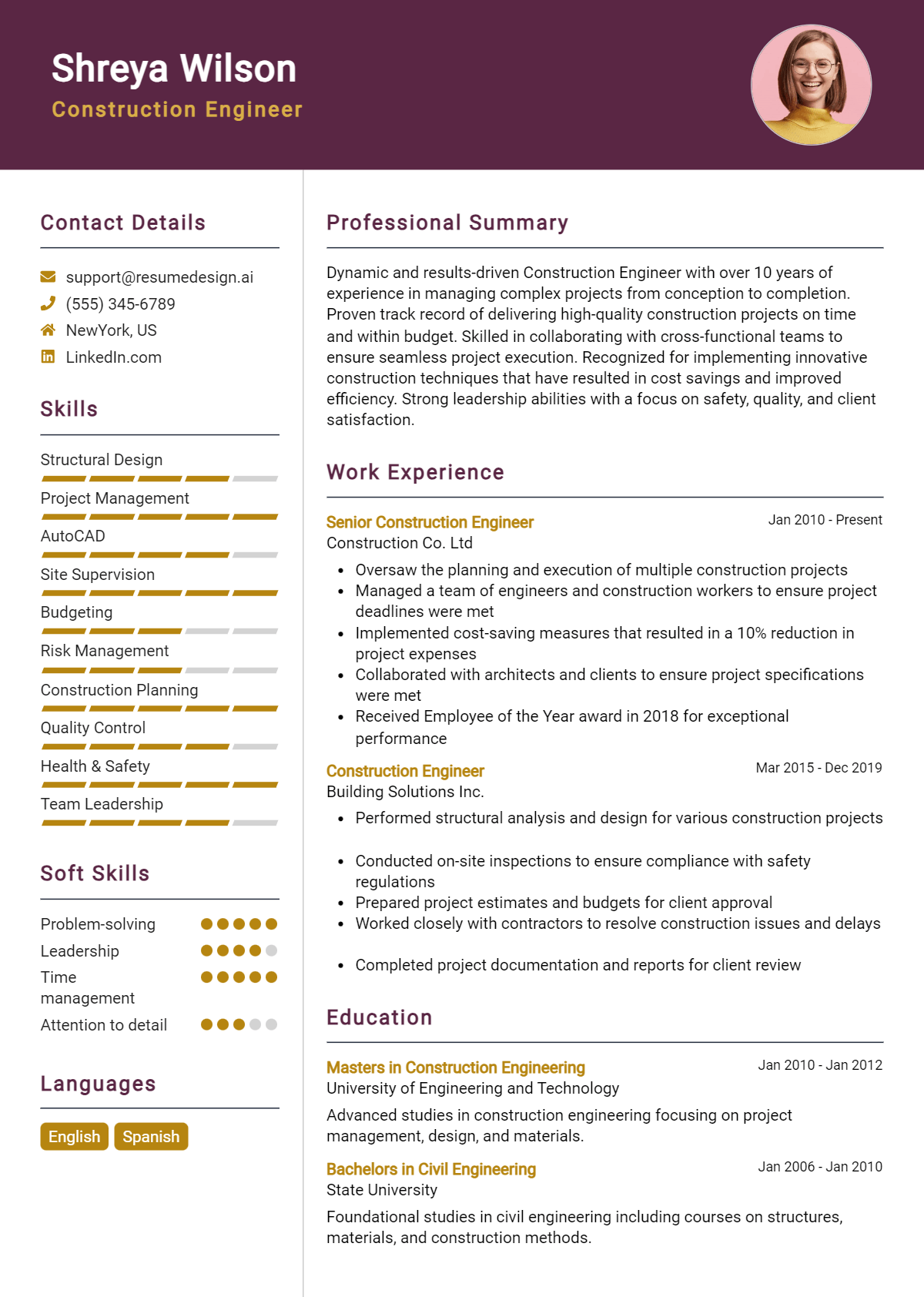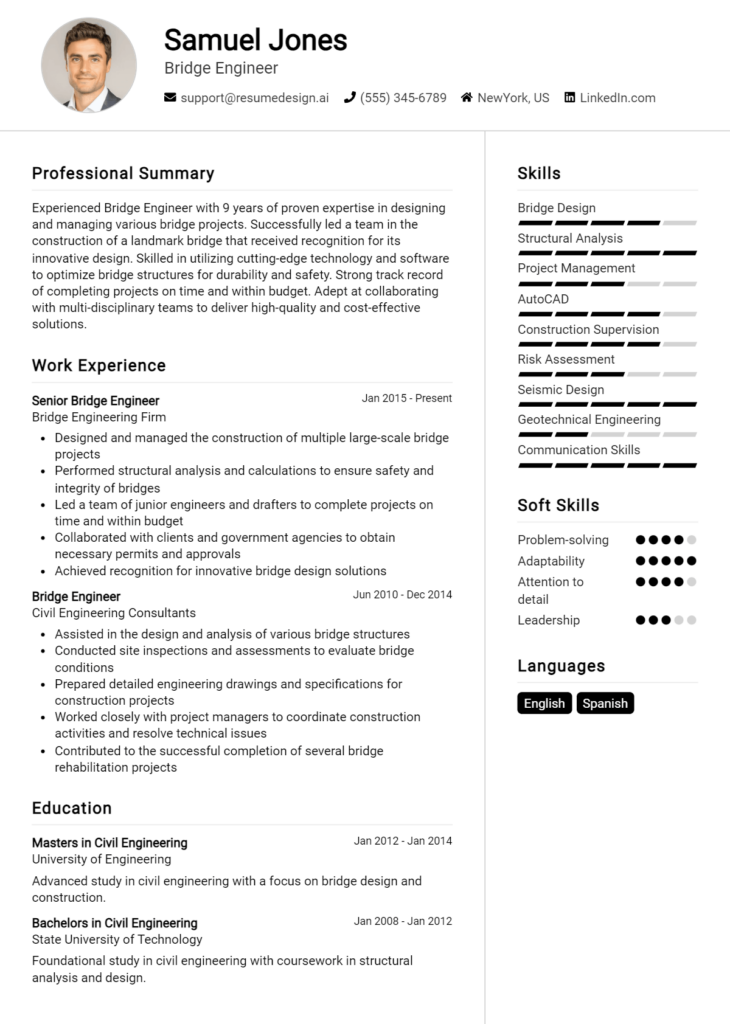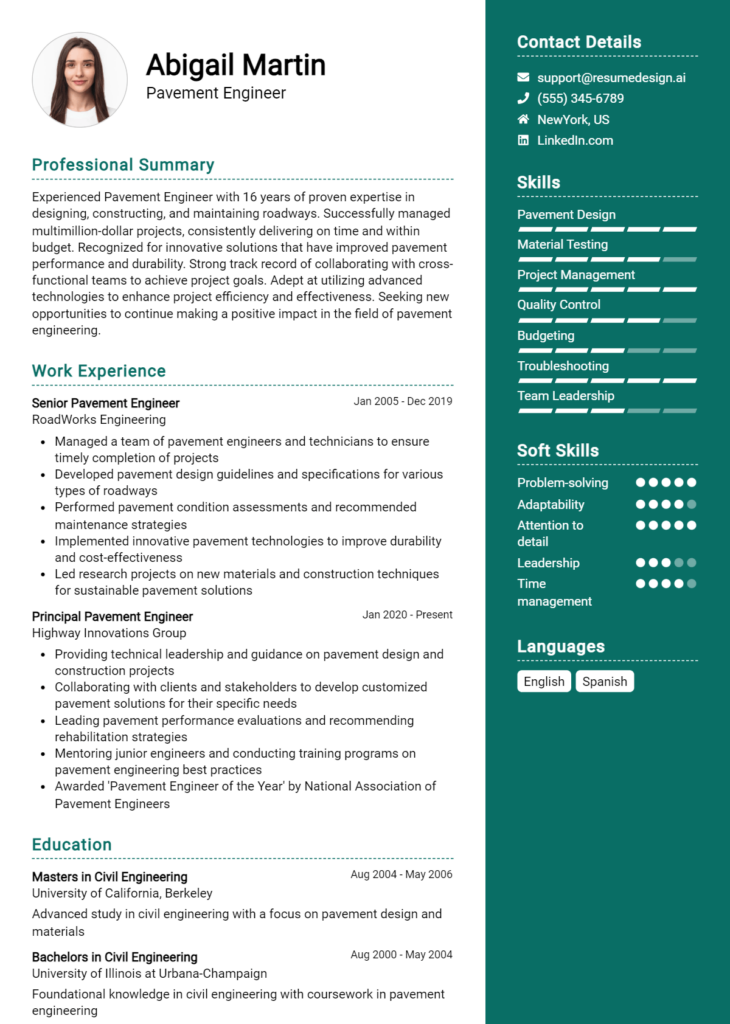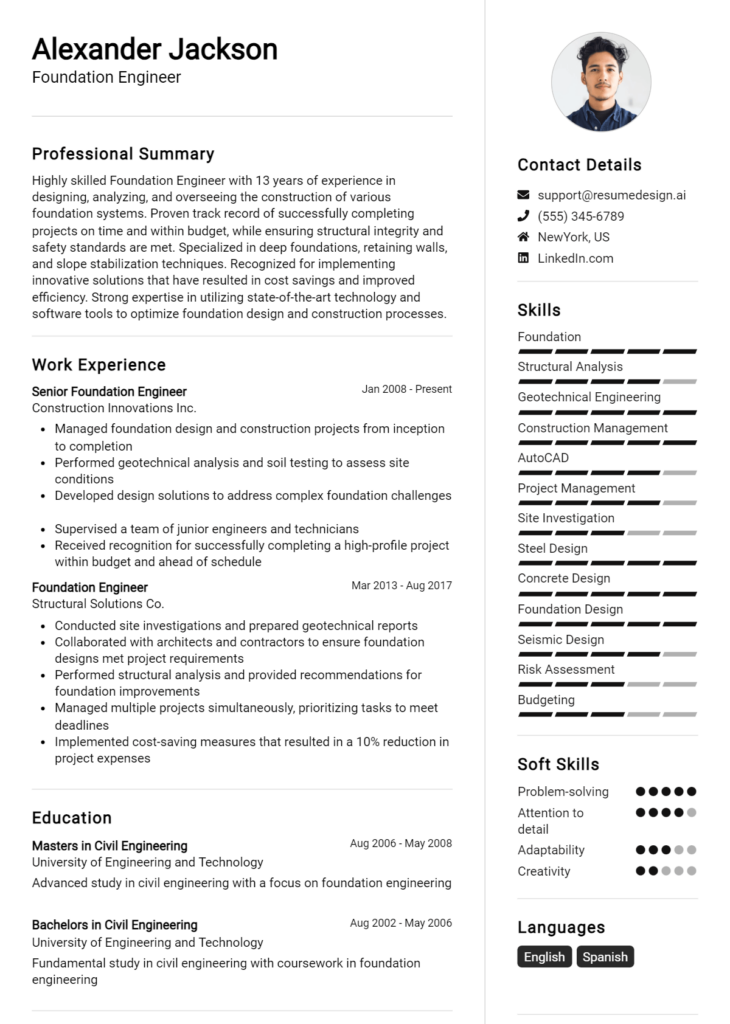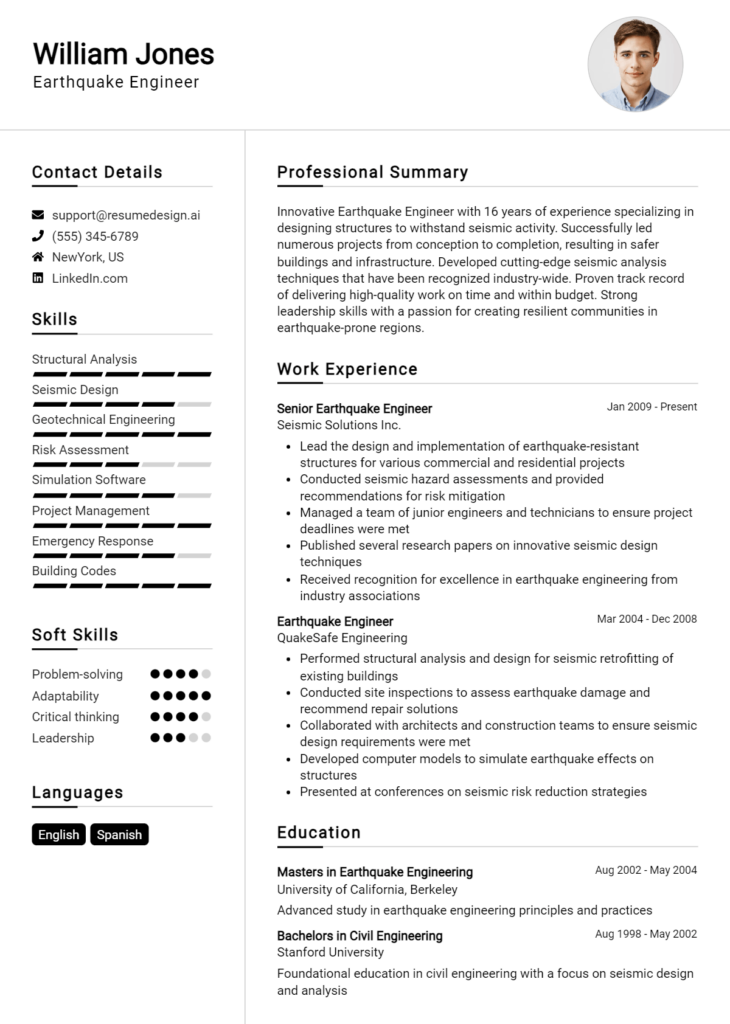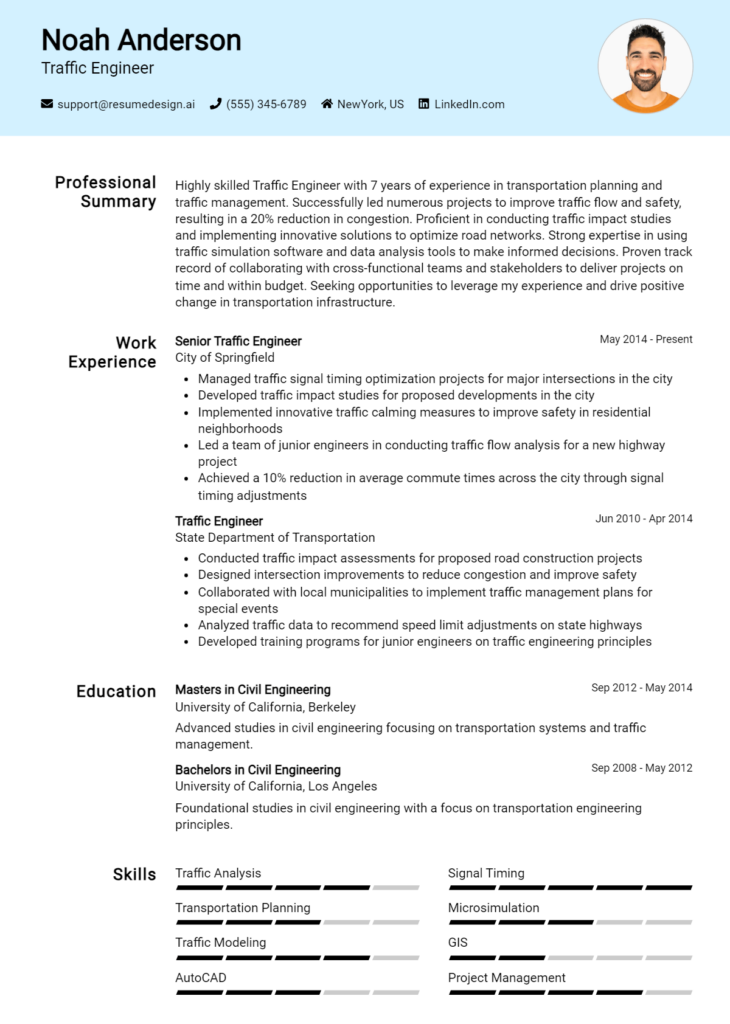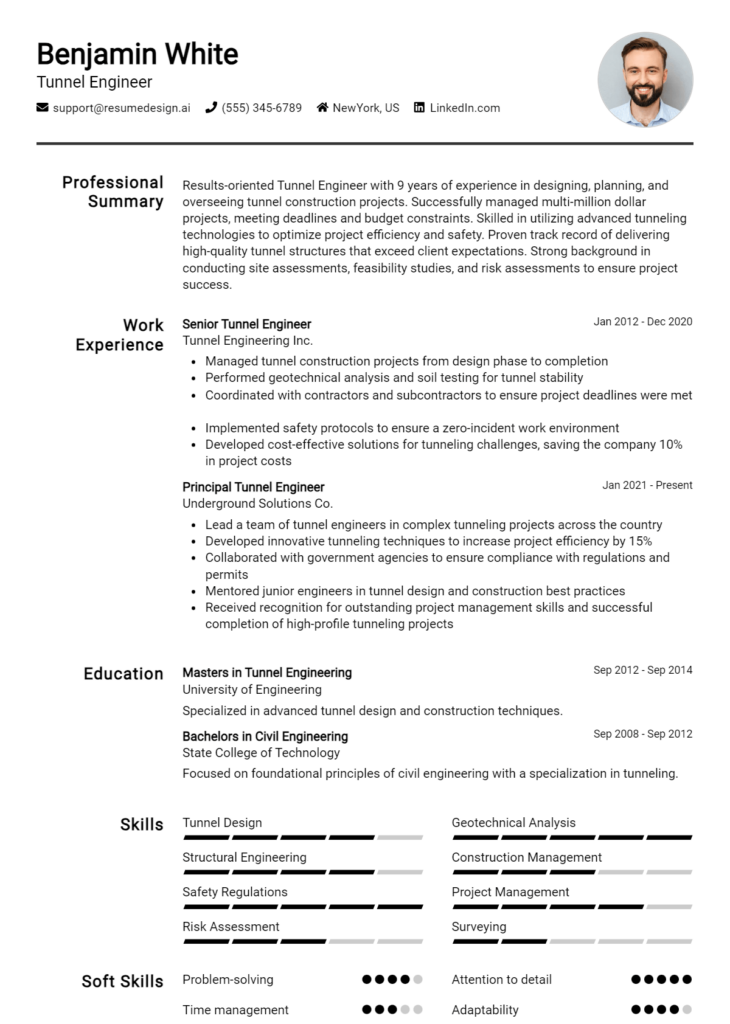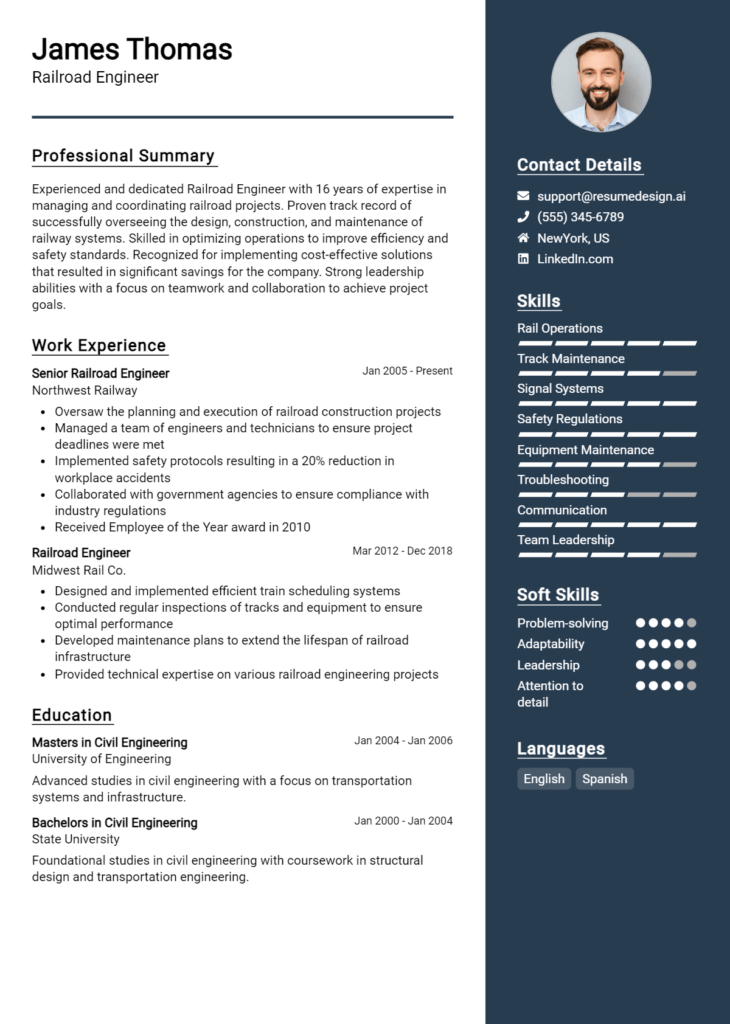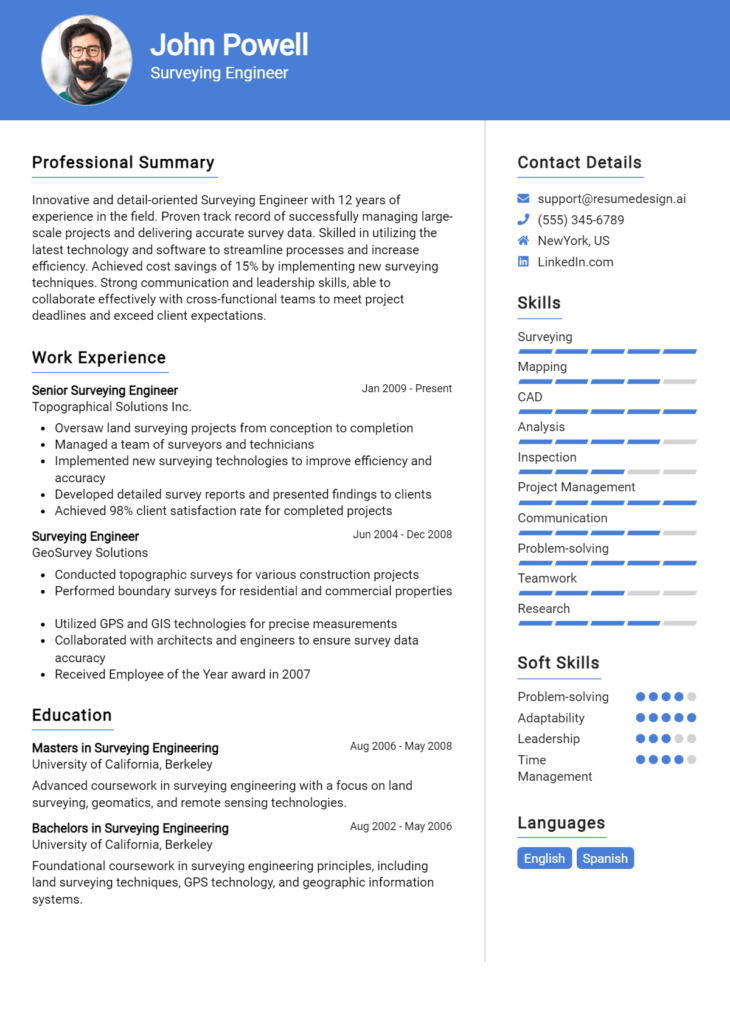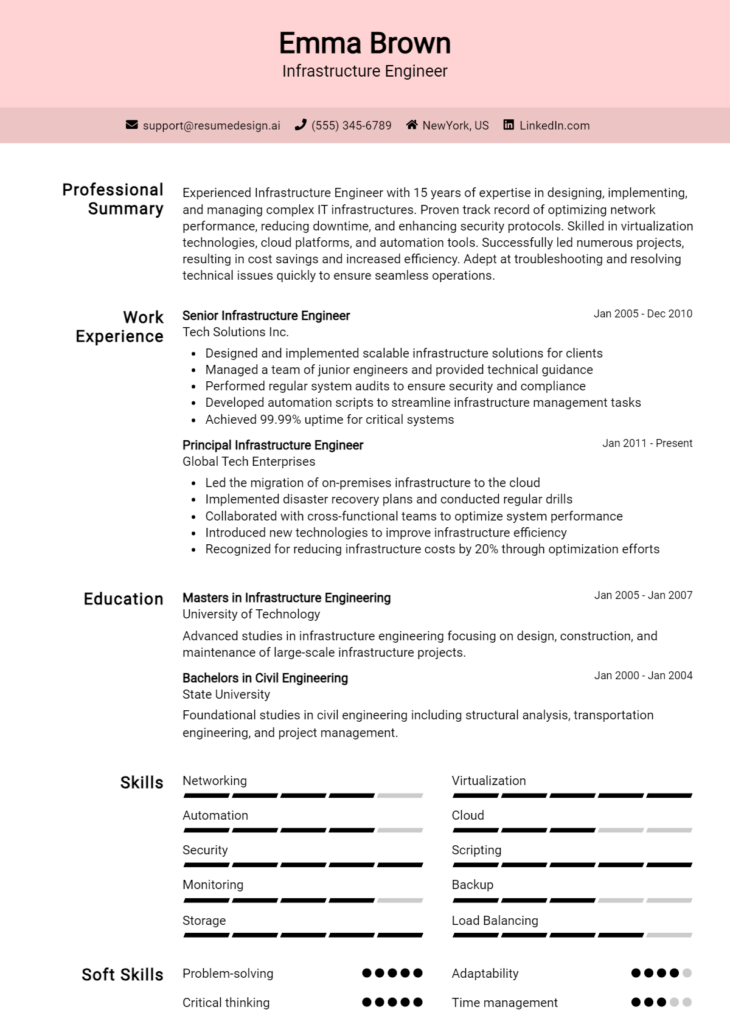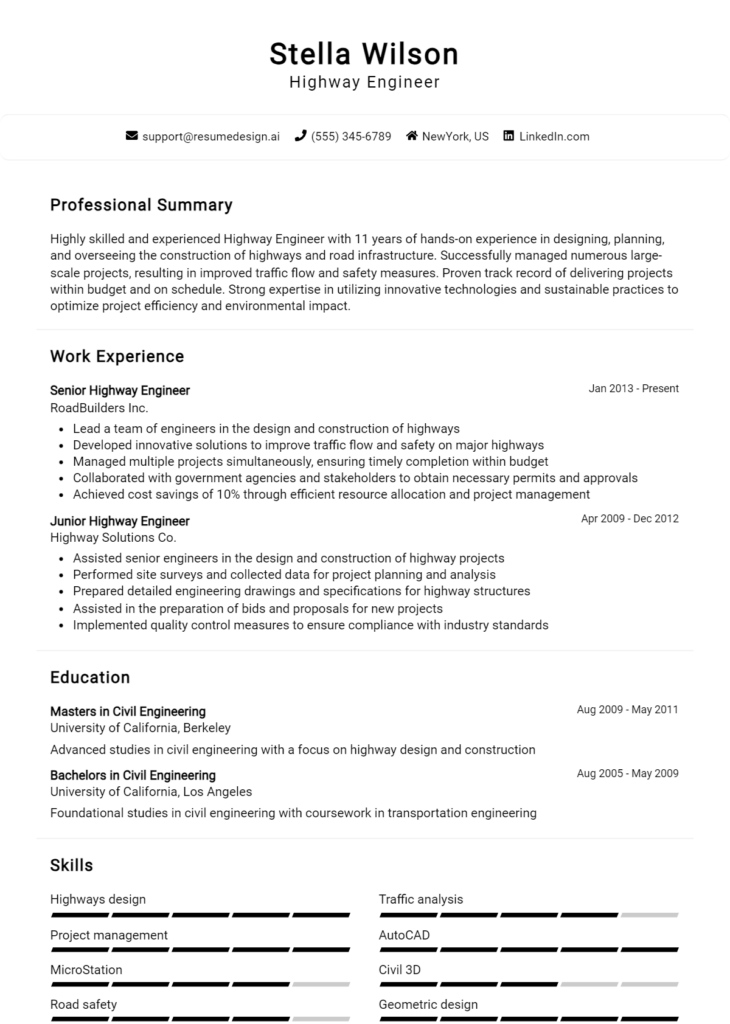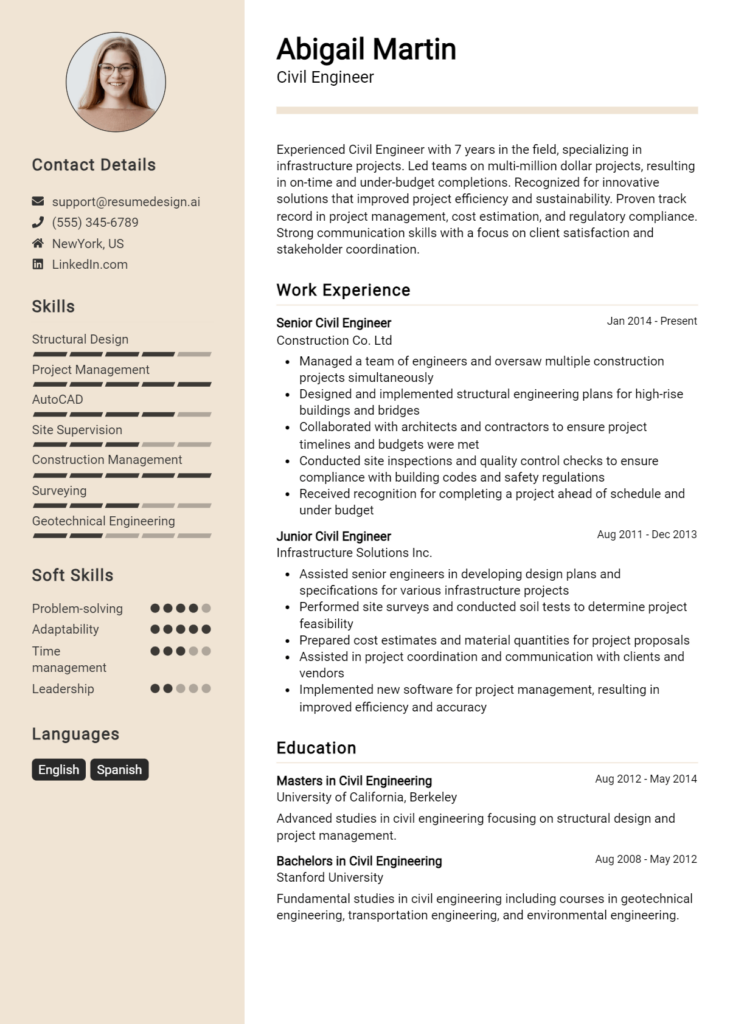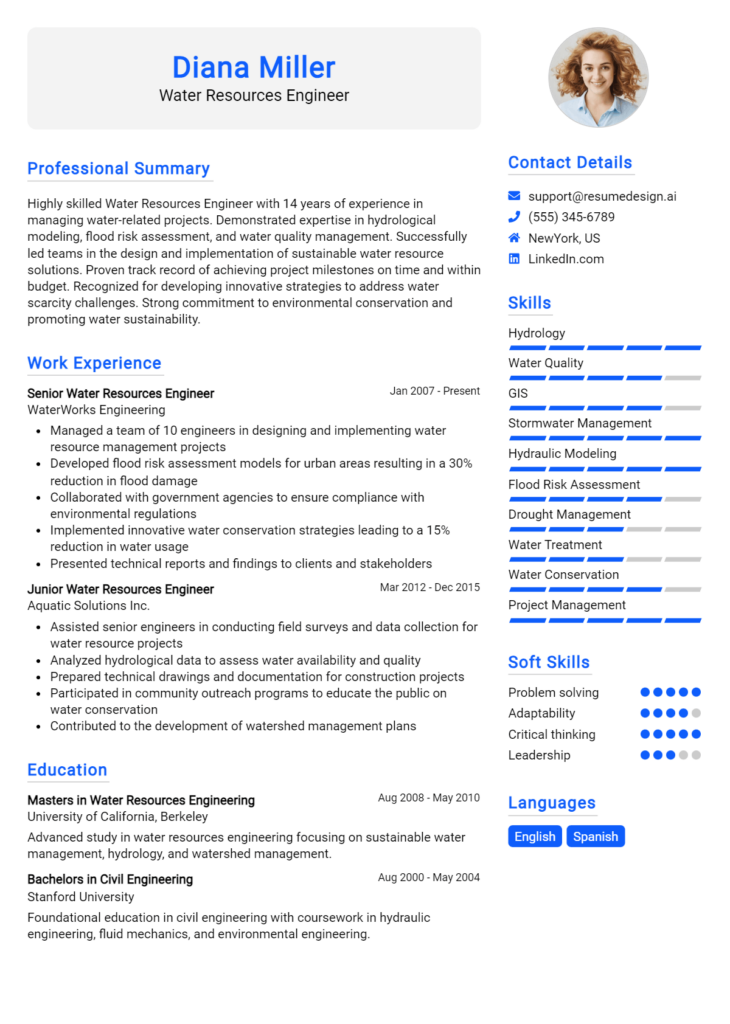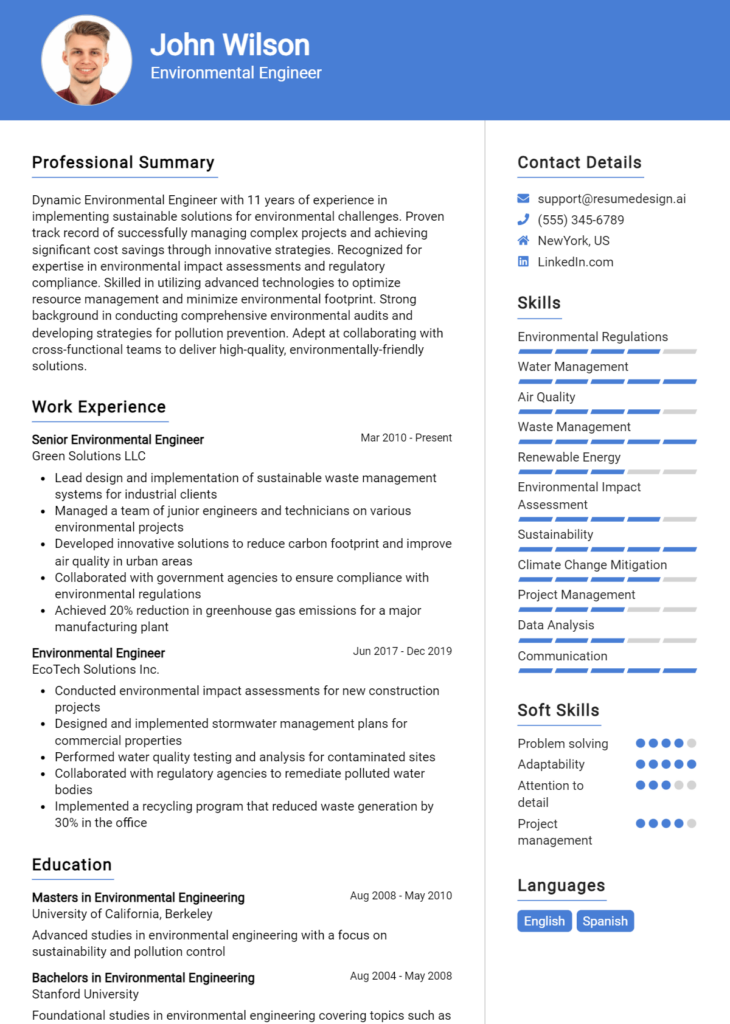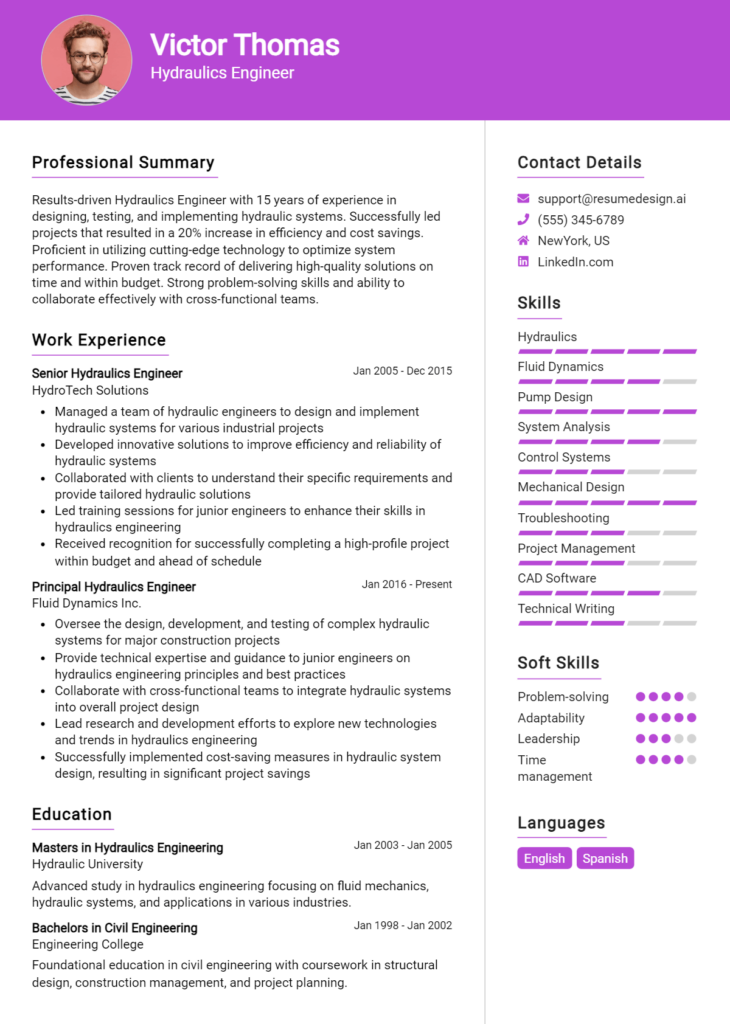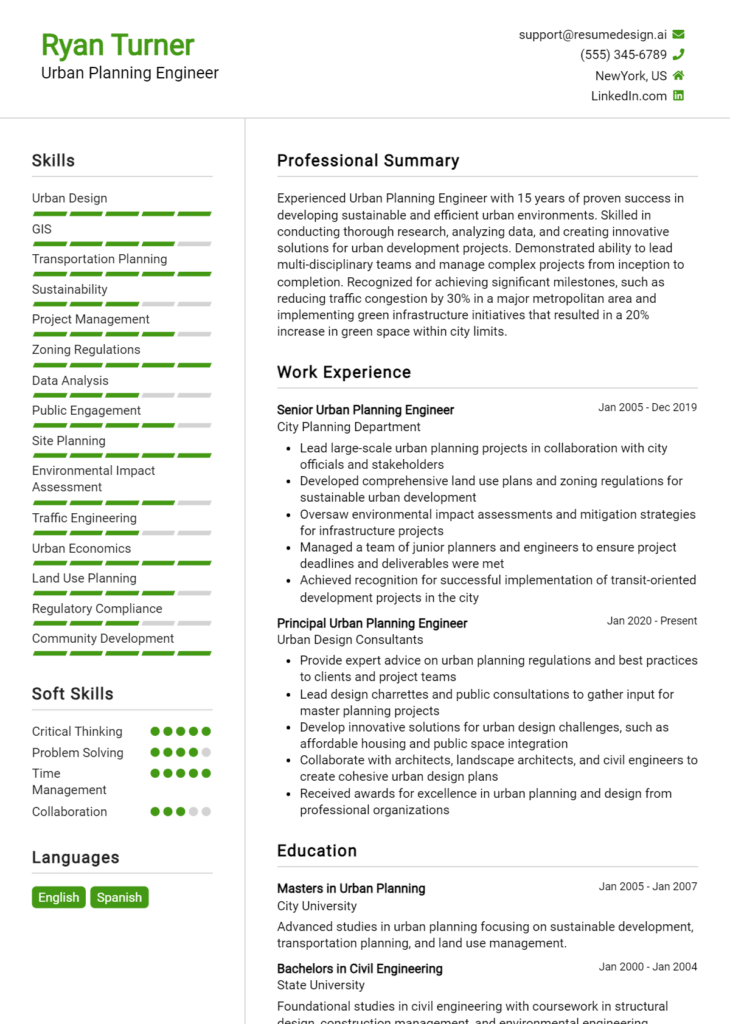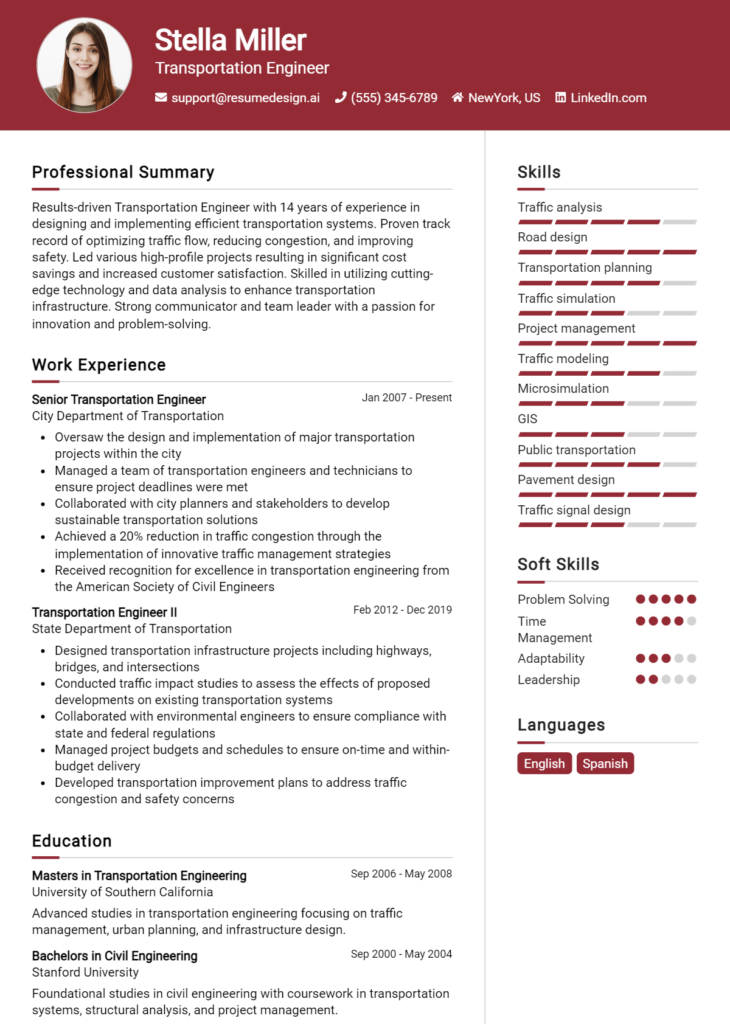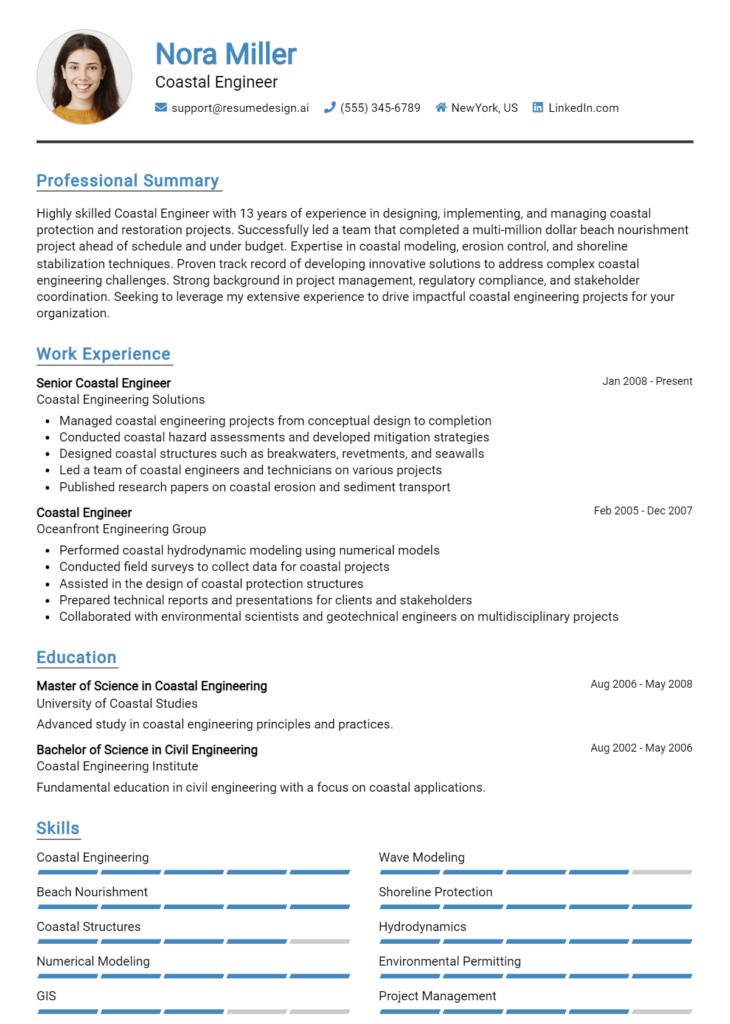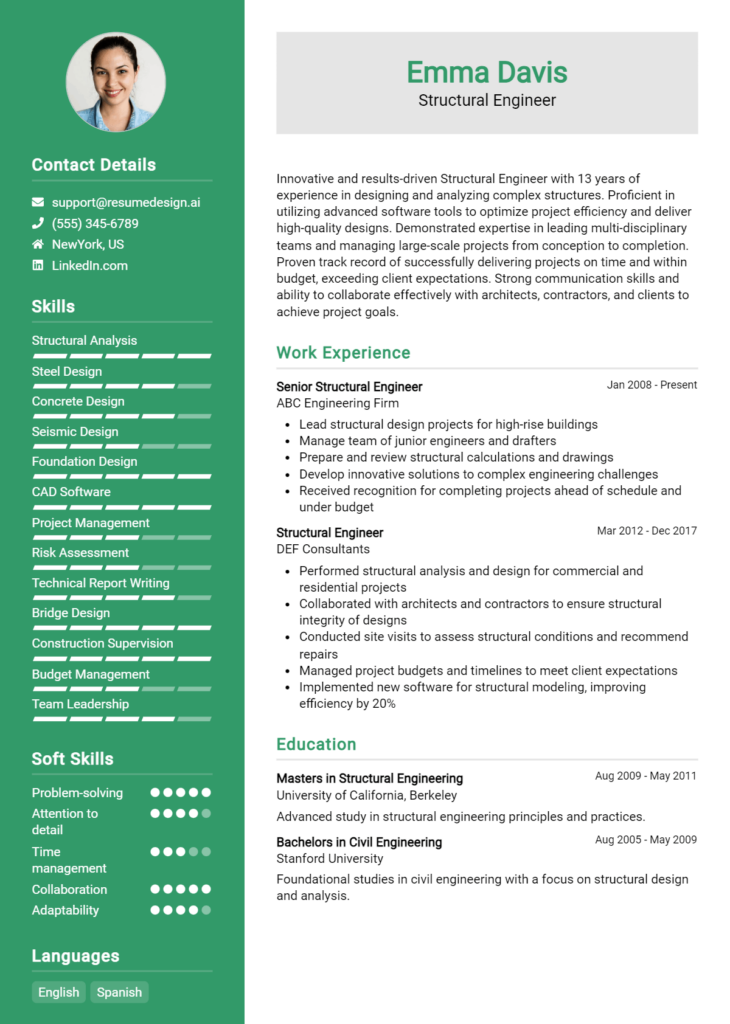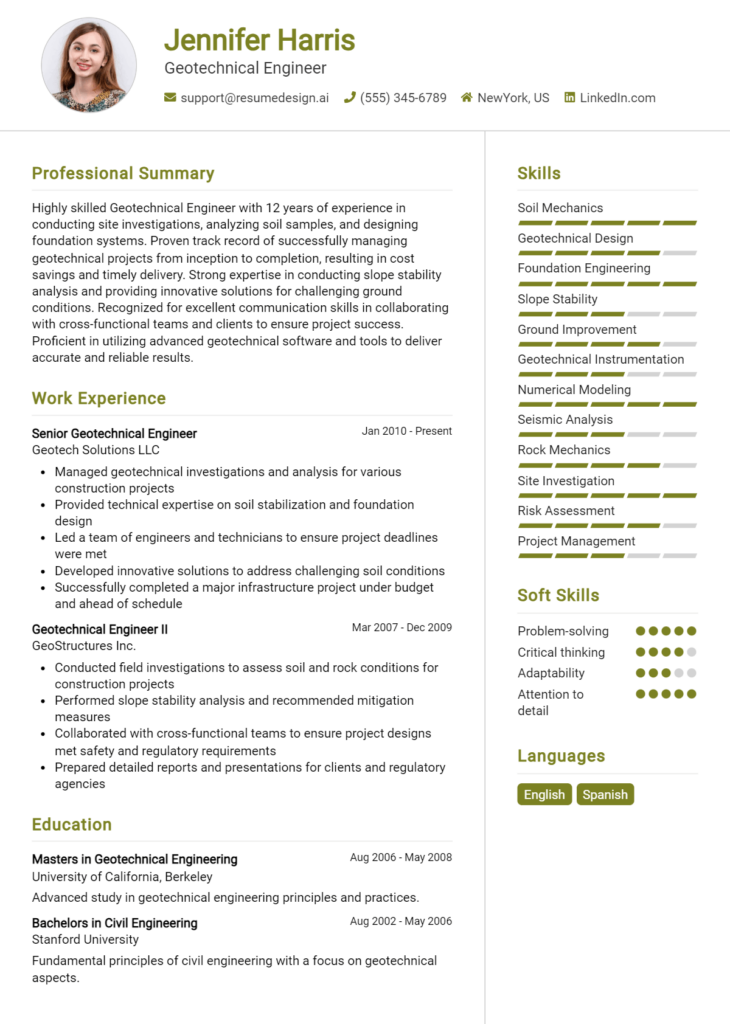Construction Engineer Core Responsibilities
A Construction Engineer plays a pivotal role in bridging various departments, ensuring seamless collaboration between design, procurement, and field operations. Key responsibilities include overseeing project planning, managing budgets, and ensuring compliance with safety regulations. Essential skills encompass technical expertise, operational efficiency, and strong problem-solving abilities, enabling engineers to address challenges proactively. These competencies are vital in achieving organizational goals, and a well-structured resume can effectively highlight these qualifications, showcasing a candidate's potential to contribute to successful project outcomes.
Common Responsibilities Listed on Construction Engineer Resume
- Develop and manage project schedules and budgets.
- Coordinate with architects, contractors, and subcontractors.
- Conduct site inspections and assess project progress.
- Ensure compliance with local, state, and federal regulations.
- Prepare technical reports and documentation.
- Implement safety protocols and risk management strategies.
- Resolve technical issues and provide innovative solutions.
- Oversee material procurement and quality control processes.
- Facilitate communication between stakeholders.
- Monitor project performance and implement improvements.
- Assist in the preparation of contract documents.
High-Level Resume Tips for Construction Engineer Professionals
In the competitive field of construction engineering, a well-crafted resume is essential for standing out among a pool of talented candidates. Your resume serves as the first impression you make on potential employers, and it must effectively convey your skills, qualifications, and achievements in a manner that resonates with hiring managers. A resume that showcases your technical expertise, project experience, and problem-solving abilities can set you apart and open doors to new opportunities. This guide will provide practical and actionable resume tips specifically tailored for Construction Engineer professionals, helping you to create a compelling document that highlights your strengths.
Top Resume Tips for Construction Engineer Professionals
- Tailor your resume to each job application by incorporating relevant keywords from the job description.
- Highlight your professional experience with a focus on construction-specific roles and responsibilities.
- Quantify your achievements by using metrics such as project budgets, timelines, and results to demonstrate your impact.
- Include industry-specific skills, such as knowledge of building codes, project management software, and engineering principles.
- Showcase any certifications or licenses relevant to construction engineering, such as PE (Professional Engineer) or PMP (Project Management Professional).
- Utilize a clean and professional format that enhances readability and makes key information easily accessible.
- Incorporate a summary statement at the top of your resume that briefly outlines your qualifications and career goals.
- List any relevant continuing education or training courses that demonstrate your commitment to staying current in the field.
- Use action verbs to describe your accomplishments and responsibilities, making your contributions clear and impactful.
- Include volunteer work or internships related to construction engineering to highlight additional experience and dedication to the field.
Implementing these tips can significantly enhance your chances of landing a job in the construction engineering field. By presenting a polished and targeted resume that effectively communicates your skills and achievements, you increase your visibility to potential employers and make a strong case for your candidacy. A well-structured resume not only reflects your professionalism but also demonstrates your ability to contribute successfully to future projects in the construction industry.
Why Resume Headlines & Titles are Important for Construction Engineer
In the competitive field of construction engineering, a well-crafted resume headline or title serves as the first impression for hiring managers. It encapsulates a candidate's key qualifications and expertise in a succinct phrase, allowing them to quickly assess suitability for the role. A strong headline can capture attention and differentiate a candidate from others, summarizing essential skills and experiences relevant to the job being applied for. By being concise, relevant, and directly related to the specific position, a compelling resume headline sets the stage for the rest of the application and enhances the likelihood of securing an interview.
Best Practices for Crafting Resume Headlines for Construction Engineer
- Keep it concise: Aim for one impactful phrase that conveys your value.
- Be specific: Use terminology and keywords relevant to construction engineering.
- Highlight key skills: Focus on skills that are in demand for the role.
- Showcase experience: Mention years of experience or notable projects.
- Use active language: Employ strong action words to convey confidence.
- Tailor to the job: Customize your headline for each application to align with the job description.
- Include certifications: If applicable, mention relevant certifications or qualifications.
- Make it compelling: Create a sense of urgency or interest to encourage further reading.
Example Resume Headlines for Construction Engineer
Strong Resume Headlines
Results-Driven Construction Engineer with 10+ Years of Experience in Large-Scale Infrastructure Projects
Detail-Oriented Construction Engineer Specializing in Sustainable Building Practices and Project Management
Certified Construction Engineer with a Proven Track Record in Cost Reduction and Efficiency Improvement
Weak Resume Headlines
Construction Engineer Looking for a Job
Experienced Professional in Construction
The strong headlines are effective because they provide specific information about the candidate's experience, skills, and unique value proposition, immediately establishing credibility and relevance. They focus on what the candidate can bring to the role, which makes them compelling to hiring managers. In contrast, the weak headlines fail to impress due to their vagueness and lack of detail, making it difficult for employers to gauge the candidate's suitability for the position. Without clear and engaging content, these headlines are unlikely to capture attention or prompt further interest in the resume.
Writing an Exceptional Construction Engineer Resume Summary
A well-crafted resume summary is essential for a Construction Engineer as it serves as the first impression to potential employers. This brief yet impactful introductory paragraph acts as a snapshot of the candidate’s key skills, relevant experience, and notable accomplishments that align with the requirements of the job. A strong summary not only captures the attention of hiring managers but also provides a compelling reason to delve deeper into the resume. It should be concise, engaging, and tailored specifically to reflect the unique qualifications and attributes that make the candidate a perfect fit for the role at hand.
Best Practices for Writing a Construction Engineer Resume Summary
- Quantify Achievements: Use numbers and statistics to highlight your accomplishments (e.g., "managed projects worth $5 million").
- Focus on Relevant Skills: Emphasize specific technical skills and competencies that are directly applicable to the construction industry.
- Tailor for the Job Description: Customize your summary to reflect the requirements and keywords found in the job posting.
- Keep It Concise: Aim for 2-4 sentences that succinctly convey your qualifications without overwhelming the reader.
- Highlight Key Accomplishments: Mention significant projects or milestones that demonstrate your expertise and impact in previous roles.
- Use Action Verbs: Start with strong action verbs to convey your contributions and initiatives effectively.
- Showcase Certifications: If applicable, include relevant certifications or licenses that enhance your credibility as a construction engineer.
- Maintain Professional Tone: Keep the language formal and professional to reflect your industry expertise.
Example Construction Engineer Resume Summaries
Strong Resume Summaries
Dynamic Construction Engineer with over 8 years of experience in managing multimillion-dollar projects, specializing in sustainable building practices. Successfully led a team that reduced construction time by 20% while maintaining a 95% client satisfaction rate.
Detail-oriented Construction Engineer skilled in project management and structural design, with a proven track record of completing projects under budget. Spearheaded a $2 million infrastructure project that increased operational efficiency by 30%.
Results-driven Construction Engineer possessing a strong foundation in civil engineering principles, complemented by expertise in AutoCAD and project scheduling. Notable for delivering a $4 million commercial project three months ahead of schedule, enhancing client relations.
Weak Resume Summaries
I am a Construction Engineer with experience in various projects. I am looking for a new opportunity in construction.
Construction Engineer seeking to apply skills in a challenging role. I have worked on many projects and am eager to learn more.
The examples of strong resume summaries stand out due to their specificity, quantifiable achievements, and direct relevance to the construction engineering role. They effectively highlight the candidate's experience and skills that align with the job requirements. In contrast, the weak resume summaries lack detail and fail to provide measurable outcomes or specific competencies, making them less compelling and memorable to hiring managers.
Work Experience Section for Construction Engineer Resume
The work experience section of a Construction Engineer resume is vital as it effectively showcases the candidate's technical skills, project management abilities, and capacity to deliver high-quality results. This section not only reflects the depth of the candidate's hands-on experience but also highlights their proficiency in collaborating with diverse teams and stakeholders. By quantifying achievements—such as project completion times, budget management, and safety improvements—candidates can demonstrate their alignment with industry standards and expectations, making them more attractive to potential employers.
Best Practices for Construction Engineer Work Experience
- Use specific technical jargon and terminologies relevant to construction engineering.
- Quantify achievements with metrics, such as cost savings, project timelines, and resource management.
- Highlight leadership roles in projects, emphasizing team management and coordination.
- Showcase collaboration with clients, architects, and subcontractors to illustrate teamwork.
- Detail specific tools, software, or methodologies used during projects.
- Include relevant certifications or training that enhance your expertise.
- Focus on results-driven outcomes that demonstrate your impact on project success.
- Tailor your experience to align with the job description and company needs.
Example Work Experiences for Construction Engineer
Strong Experiences
- Led a team of 10 engineers in the completion of a $2 million commercial building project, finishing 15% under budget and 2 weeks ahead of schedule.
- Implemented a new project management software that improved workflow efficiency by 30%, resulting in faster project delivery across multiple sites.
- Collaborated with architects and subcontractors to redesign structural elements, enhancing safety compliance and reducing material costs by 20%.
- Managed the construction of a highway overpass, ensuring adherence to safety regulations and achieving a zero-accident record on-site throughout the project.
Weak Experiences
- Worked on various construction projects.
- Assisted in team tasks and contributed to project planning.
- Involved in safety meetings and ensured compliance.
- Helped with paperwork and documentation for projects.
The strong experiences listed above are considered effective because they clearly quantify results and articulate specific contributions to project success, showcasing technical leadership and collaboration. In contrast, the weak experiences lack detail and measurable outcomes, making them less impactful and failing to convey the candidate's true capabilities or achievements in the construction engineering field.
Education and Certifications Section for Construction Engineer Resume
The education and certifications section of a Construction Engineer resume is crucial as it showcases the candidate's academic background, industry-relevant certifications, and commitment to continuous learning. This section not only highlights the foundational knowledge gained through formal education but also emphasizes specialized training that aligns with the demands of the construction industry. By providing relevant coursework and certifications, candidates can significantly enhance their credibility and demonstrate their preparedness for the role, making them more appealing to potential employers.
Best Practices for Construction Engineer Education and Certifications
- Tailor the education section to include degrees and certifications that are directly related to construction engineering.
- Include relevant coursework that supports your expertise in areas such as structural design, project management, and materials science.
- Highlight advanced degrees, such as a Master’s in Civil Engineering or Construction Management, to demonstrate higher-level knowledge.
- List industry-recognized certifications, such as Professional Engineer (PE) or Project Management Professional (PMP), to enhance credibility.
- Incorporate continuing education courses or workshops that showcase recent advancements in construction technology or practices.
- Be specific about the institution name, degree earned, and graduation date for clarity and credibility.
- Use bullet points for easy readability and to draw attention to key qualifications.
- Keep the section updated to reflect any new accomplishments or relevant training completed.
Example Education and Certifications for Construction Engineer
Strong Examples
- Bachelor of Science in Civil Engineering, University of California, Berkeley, Graduated May 2020
- Certified Construction Manager (CCM), Construction Management Association of America, 2021
- Master of Science in Construction Management, Stanford University, Expected Graduation May 2024
- Completed coursework in Advanced Structural Analysis and Sustainable Construction Practices.
Weak Examples
- Associate Degree in General Studies, Community College, 2018
- Certification in Basic Computer Skills, Local Training Center, 2019
- High School Diploma, Anytown High School, 2016
- Outdated certification in Construction Safety from 2015, lacking current relevance.
The strong examples are considered effective because they are directly relevant to the construction engineering field, demonstrating both a solid educational foundation and recognized professional credentials. In contrast, the weak examples show a lack of focus on construction-specific qualifications and include certifications and degrees that do not align with the requirements of a Construction Engineer role, making them less impactful to potential employers.
Top Skills & Keywords for Construction Engineer Resume
In the competitive field of construction engineering, having the right skills highlighted in your resume can make a significant difference in standing out to potential employers. A well-crafted resume that emphasizes both hard and soft skills demonstrates not only your technical expertise but also your ability to work effectively with diverse teams, manage projects, and solve problems on-site. By focusing on these essential skills, you can effectively showcase your qualifications and increase your chances of landing your desired job in construction engineering.
Top Hard & Soft Skills for Construction Engineer
Soft Skills
- Communication
- Teamwork
- Problem-solving
- Time management
- Leadership
- Adaptability
- Attention to detail
- Conflict resolution
- Critical thinking
- Negotiation skills
- Creativity
- Stress management
- Interpersonal skills
- Decision-making
- Client relations
- Organization skills
Hard Skills
- Project management
- AutoCAD proficiency
- Civil engineering principles
- Structural analysis
- Building codes and regulations
- Cost estimation
- Surveying techniques
- Quality control processes
- Construction safety standards
- Materials science
- Structural design software (e.g., Revit, SAP2000)
- Geotechnical engineering
- Microsoft Project
- BIM (Building Information Modeling) technology
- Environmental regulations
- Site management
For additional insights on how to effectively incorporate these skills and relevant work experience into your resume, consider exploring various resources to ensure your application stands out.
Stand Out with a Winning Construction Engineer Cover Letter
Dear Hiring Manager,
I am writing to express my interest in the Construction Engineer position at [Company Name], as advertised on [Where You Found the Job Posting]. With a Bachelor's degree in Civil Engineering and over [X years] of hands-on experience in managing and executing construction projects, I am confident in my ability to contribute effectively to your team. My background in both residential and commercial construction, coupled with my strong problem-solving skills, make me a perfect fit for this role.
Throughout my career, I have successfully overseen multiple projects from conception to completion, ensuring that they are delivered on time and within budget. My experience includes conducting site assessments, preparing cost estimates, and coordinating with subcontractors and suppliers. At my previous position with [Previous Company Name], I played a key role in the completion of a [Specific Project or Achievement], where I implemented innovative engineering solutions that improved efficiency by [X%]. This experience has equipped me with the expertise to tackle challenges and find solutions that align with both client expectations and industry standards.
In addition to my technical skills, I pride myself on my ability to communicate effectively with diverse teams and stakeholders. I understand the importance of collaboration in the construction industry, and I strive to foster a positive working environment while maintaining a focus on safety and quality. I am particularly drawn to [Company Name] because of your commitment to sustainable building practices and innovative design, and I am eager to contribute to projects that prioritize both functionality and environmental responsibility.
Thank you for considering my application. I am excited about the opportunity to bring my unique skills and experience to [Company Name] and help drive successful construction projects. I look forward to the possibility of discussing my application further and exploring how I can make a meaningful impact on your team.
Sincerely,
[Your Name]
[Your Phone Number]
[Your Email Address]
Common Mistakes to Avoid in a Construction Engineer Resume
When crafting a resume for a Construction Engineer position, it's essential to present a clear and compelling narrative of your skills and experiences. However, many candidates make common mistakes that can undermine their chances of landing an interview. By avoiding these pitfalls, you can ensure that your resume stands out and effectively showcases your qualifications. Here are some common mistakes to watch out for:
Vague Job Descriptions: Failing to provide specific details about your previous roles can leave hiring managers unclear about your actual responsibilities and achievements. Use quantifiable results to demonstrate your impact.
Ignoring Keywords: Not incorporating relevant keywords from the job description may result in your resume being overlooked by applicant tracking systems (ATS). Tailor your resume for each application to ensure it aligns with the job requirements.
Overloading with Technical Jargon: While it's important to show your technical expertise, excessive jargon can alienate readers who may not be familiar with specific terms. Strive for clarity and ensure your resume is understandable to all potential reviewers.
Lack of Focus on Soft Skills: Construction Engineers require strong communication and teamwork abilities. Neglecting to highlight these soft skills can lead to an incomplete picture of your suitability for the role.
Formatting Issues: An unorganized or cluttered resume can make it difficult for hiring managers to navigate your information. Use clear headings, bullet points, and a consistent format to enhance readability.
Not Tailoring the Resume: Sending a generic resume for multiple job applications can signal a lack of interest in the specific position. Customize your resume for each application to reflect your alignment with the company's needs.
Omitting Relevant Certifications: Construction is a highly regulated field, and certain certifications may be required or preferred. Failing to include relevant licenses or certifications can diminish your credibility as a candidate.
Listing Responsibilities Instead of Achievements: Simply stating what you did in previous roles without highlighting your accomplishments can weaken your resume. Focus on what you achieved, such as projects completed on time and under budget, to create a stronger impact.
Conclusion
As a Construction Engineer, your resume is a critical tool in showcasing your skills, experience, and achievements in the industry. Key points to consider when crafting your resume include:
Highlighting Relevant Skills: Focus on technical competencies such as project management, structural analysis, and knowledge of construction materials. Be sure to include soft skills like communication and teamwork, which are vital in collaborative environments.
Demonstrating Experience: Use quantifiable metrics to illustrate your accomplishments. For instance, mention projects you've completed on time and within budget, or improvements you've made that resulted in cost savings or enhanced safety.
Certifications and Education: Clearly outline your educational background and any certifications relevant to the construction field, such as Professional Engineer (PE) status or OSHA certifications.
Tailoring for Each Application: Customize your resume for each job application to align with the specific requirements and keywords found in the job description. This increases your chances of catching the attention of hiring managers and applicant tracking systems.
In conclusion, take a moment to review your Construction Engineer resume to ensure it effectively communicates your qualifications and readiness for your next career opportunity. To assist you in this process, consider utilizing resources like resume templates, which can provide a strong foundation for your document. Additionally, our resume builder offers an intuitive way to create a polished resume tailored to your experience. If you're looking for inspiration, check out our resume examples to see how others in your field present their qualifications. Lastly, don’t forget to enhance your application with our cover letter templates, which can help you make a memorable first impression. Start refining your resume today and take the next step in your career!

